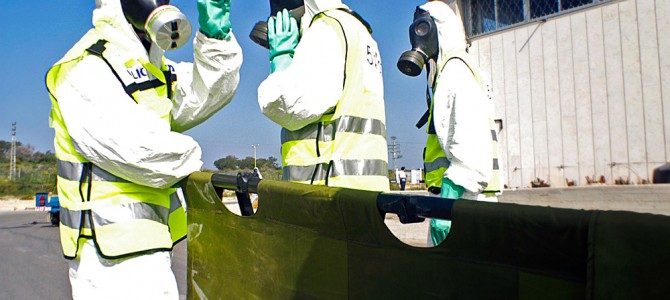
The announcement Wednesday of a “framework” for a nuclear deal with Iran made clear that the Iranians will get nearly everything they want from the West: a painless way to end sanctions while preserving most key elements of their nuclear program—including an illicit nuclear enrichment plant buried deep under a mountain, where more than 1,000 centrifuges will continue spinning far beyond the reach of inspectors.
Nevertheless, the Obama administration hailed it as a triumph. Iran will reduce its stockpile of enriched uranium, reduce its total number of centrifuges, and submit to United Nations inspections so that “If Iran cheats, the world will know it,” as President Obama said. Secretary of State John Kerry assured us that, if Iran steps out of line, sanctions will “snap back into place.” Obama added: “This deal is not based on trust. It’s based on unprecedented verification,” averring that it “cut off every pathway that Iran could take to develop a nuclear weapon.”
Lots Ventured, Nothing Gained
Of course, it does no such thing. Right now, the agreement is only on “key parameters” of a future final agreement the administration hopes to reach by the end of June. But the parameters make plain that any final deal won’t be worth the scrap of paper it’s not written on. No nuclear facilities will close, enrichment will continue on thousands of centrifuges all over the country, and Iranian scientists will be allowed to continue researching and developing advanced centrifuges.
Then there’s the mountain fortress at Fordow, built in secret a decade ago 200 feet under a mountainside at a time when Iran was claiming it had no secret facilities. The United States, France, and Britain publicly revealed the plant in 2009, and experts have long considered closing the site a key strategic priority for the United States. Now, it’s apparently going to be used “for peaceful purposes only”—because of course the ideal place for a “research center” is a secret underground nuclear fortress.
But Fordow’s continued operation undermines any future deal by putting Iran’s nuclear R&D and infrastructure out of the West’s reach. One assumes the site will be subject to inspectors, but with Fordow intact Iran’s “breakout time” to develop a weapon will be far less than a year, as the administration claims. That means if Iran throws inspectors out or stalls them, as the regime is wont to do, it could have a bomb before feeling the effects of sanctions or even before sanctions could be leveled.
Terrorists with Nukes: What Could Go Wrong?
But with so many details yet to be hammered out and nothing more than a fact sheet to show the world, why announce anything? As John Podhoretz at Commentary explains, “The ‘framework’ codifies the Obama administration’s cave-ins but casts them as thrilling reductions in Iran’s capacities rather than what they are—a pie-in-the-sky effort to use inspections as the means by which the West can ‘manage’ the speed with which Iran becomes a nuclear power.”
That is, the administration is preemptively negotiating an arms-control treaty with what it has accepted will eventually be a nuclear Iran. Announcing the framework now, and pretending we are just negotiating a nuclear agreement, is a way to sideline Congress. In this, the White House is suborning foreign policy priorities to domestic political ones, as it often does.
The danger in all this is very real. The Middle East has become a hotbed of simultaneous conflicts, with a Saudi Arabia-led coalition arrayed against Iranian proxies in Yemen, the Islamic State battling for a foothold in North Africa, and Syria’s regional civil war dragging on as fighting rages in Iraq. House Speaker John Boehner said Wednesday in Jerusalem that the “world is on fire.” If it’s not, it soon could be.
In this context, it doesn’t take a nuclear expert to see that Iran, freed from sanctions and able to walk right up to the edge of attaining a nuclear weapon, might see fit to take the final step and tip the regional balance of power in its favor, even at the risk of Western sanctions. Perhaps the administration sees that, too, and has been negotiating from that premise, looking to manage Iran’s acquisition of a nuclear weapon rather than prevent it altogether.
Of course, it’s also possible that the president believes what he’s saying about Iran. Perhaps he believes that we have not really begun a countdown to war in the Middle East, that “consultation shall be the method adopted to deal with any other questions that may concern our two countries,” and that he is about to secure, at last, peace for our time.









